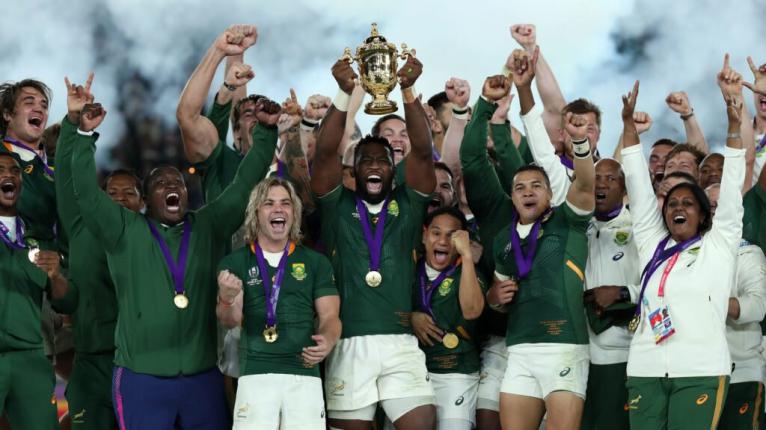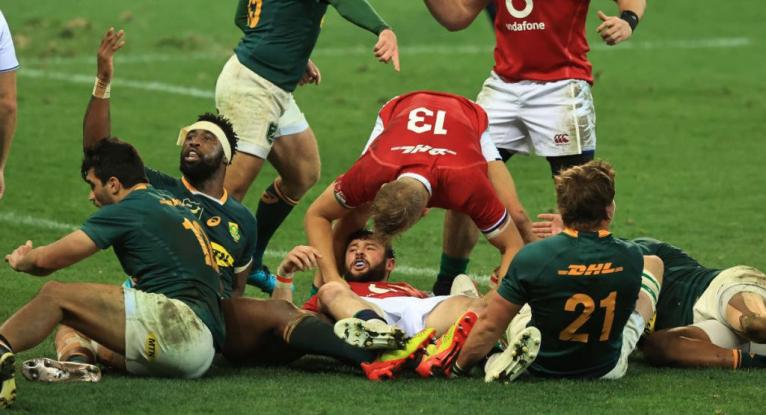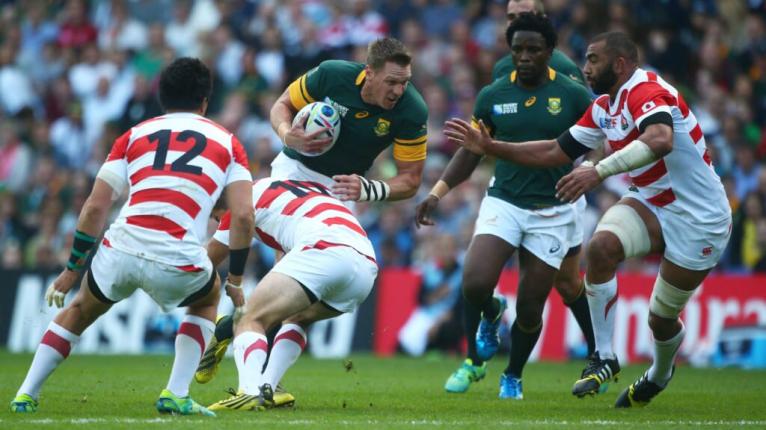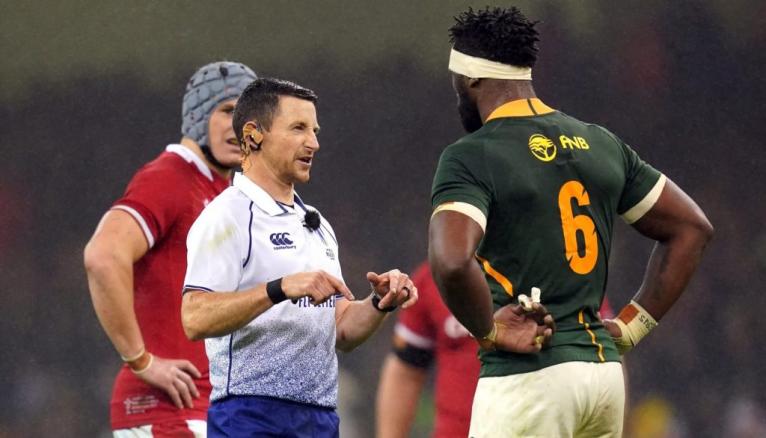Siya Kolisi’s story is inspirational. Nobody could have predicted that a malnourished kid from the poverty-stricken township of Zwide would grow up to become the captain of the Springboks and one of the most influential figures in the game.
Since winning the World Cup, Kolisi and the Boks have gone on to claim a monumental series victory against the British & Irish Lions. While some have criticised the skipper for pursuing a number of commercial interests, it’s important to note how Kolisi has leveraged his fame and influence to tackle a variety of socio-economic issues in what remains a troubled South African society.
That said, the Kolisi story is essentially a rugby one, and the man – by his own admission – is not a celebrity but an athlete who continues to harbour a number of rugby-oriented goals.
Kolisi has been with the Boks for eight seasons. He has won a Rugby Championship, a World Cup, a Lions series and has featured in a rare triumph against the All Blacks in New Zealand.
While it’s fair to say that Kolisi has fulfilled an important role in previous international campaigns, it’s only in 2021 where he has started to realise his potential as a player. The performances against the Lions and the All Blacks, and more recently against Wales and Scotland, have spoken to a revised physical and mental approach.
Kolisi has taken giant strides since that fixture in Yokohama two years ago. His cool leadership will be an asset inside the cauldron of Twickenham.
England would do well to keep this in mind when they host South Africa in what is effectively a replay of the 2019 World Cup final. Kolisi has taken giant strides since that fixture in Yokohama two years ago. His cool leadership will be an asset inside the cauldron of Twickenham. His impact as a ball-carrier and defender could swing the contest South Africa’s way.
The events of the past 12 months have certainly contributed to Kolisi’s transformation. Indeed, one wonders what might have transpired in 2021 if Kolisi had opted to remain with the Stormers instead of moving to the Sharks.
In late 2020, the embattled Stormers administration fell out with would-be investors MVM Holdings, who are closely linked to Roc Nation, the US entertainment agency who boast high-profile rugby clients such as Maro Itoje, Cheslin Kolbe and Kolisi.
MVM subsequently entered into a game-changing partnership with the Sharks. It wasn’t long after that Kolisi signed a contract with the Durban-based franchise.
The move to South Africa’s east coast provided the flanker with an opportunity to reset. It required a major sacrifice, though, as he was forced to leave his wife Rachel, his two young children, as well as his two teenage siblings – who were adopted by the Kolisi family in 2016 – at home in Cape Town until the end of the school year.

When I interviewed Kolisi in February, he was optimistic about what he might achieve with the Sharks and what a new eating plan and fitness regimen might mean for the Test season. He name-checked dieticians, biokineticists and conditioning coaches; the experts that had been tasked with rebuilding Kolisi 2.0.
The Sharks opted to retain Lukhanyo Am as their skipper and this allowed Kolisi to focus on his role as a player. Those were hard months, as Kolisi battled back from a series of injuries and attempted to push his body in the unforgiving Durban heat.
Critics doubled down after Kolisi made an unremarkable return to play in the Currie Cup. His claim to the Springbok No6 jersey – and the captaincy – was questioned more and more as the series against the Lions approached.
South Africa coach Jacques Nienaber, who had worked with Kolisi since the flanker joined the Western Province academy in 2010, kept the faith. He backed Kolisi to start in the season opener against Georgia.
A Covid-19 outbreak in the Bok camp forced Kolisi and others to spend 10 days in isolation. Kolisi was unable to train during this period and only linked up with the team a few days before the first Test against the Lions.
The Boks, with Kolisi and other underdone players in tow, lost 22-17. And sure enough, more questions were asked about Kolisi’s leadership as well as his claim to a starting place.
The response by the player and by the collective was emphatic. Indeed, the second Test against the Lions, and ultimately the three-game series in South Africa, hinged on one incident at the end of the first half.
As the Lions worked their way deep into the Springboks’ 22, scrum-half Ali Price kicked for Robbie Henshaw to chase. The Irish centre crashed over the tryline and claimed the score. Referee Ben O’Keeffe, however, was unsighted and called for a TMO review.
The replay highlighted the desperation of the Springbok defenders, and of their captain in particular. Kolisi tackled Henshaw as he dived towards the line. As the pair descended, Kolisi clamped his arm under the ball and then worked to dislodge it from Henshaw’s grasp.
After the officials disallowed the try, the South Africans crowded round their skipper to celebrate the moment – a massive one in the context of the game and series. The Boks went on to win 27-9, and rode the resultant momentum into the third and decisive Test, where they clinched a narrow contest to complete a 2-1 series victory.

In the past, Kolisi has been content to serve the team in a more understated manner, racing from breakdown to breakdown to secure possession so that his team may attack from a favourable platform. In 2021, however, he has taken on more responsibility at the gainline. He has become one of the team’s most potent ball-carriers and defenders, and has contributed with big plays at key moments.
The game between the Boks and Wales was in the balance when Kolisi raced back to make a try-saving tackle on wing Louis Rees-Zammit. South Africa went on to win that Test in Cardiff by five points – although they may have lost if not for Kolisi’s determined defence.
Jean de Villiers, who was the captain at the Boks and Stormers during the initial stages of Kolisi’s career, believes that the player has reached another level.
There has always been more pressure on Siya as the first black African captain. And since the World Cup win, he has had a lot more to worry about on the commercial side of things. Everyone wants a piece of him.
Jean de Villiers
“It’s fantastic to see him getting some recognition for his actual performances, because what he does goes largely unnoticed,” De Villiers told RugbyPass+.
“People forget the injury problems he had at the start of the year. He hadn’t had a lot of game-time by the time he went into the Lions series, so it was unfair to expect a whole lot in those games.
“There has always been more pressure on Siya as the first black African captain. And since the World Cup win, he has had a lot more to worry about on the commercial side of things. Everyone wants a piece of him.
“Some people might see that he’s getting more attention and they will ask if he has lost sight of what’s really important. I guess you have to accept that kind of criticism when you’re at the top. A lot of people will support you, but some will want you to fail. That’s just the nature of the job, and it helps to have a solid support base and leadership group to fall back on.
“You can’t make excuses, though. You have to go out there and stand up – and Siya has done exactly that this season.
“He has been very impressive from a physical point of view, as a ball-carrier and as a defender. He has probably been underrated in that department for a while. When a captain plays like that in the big matches, it can lift the entire team.
“He went beyond that in the Lions series. Perhaps that highlights the magnitude of those Lions games: they force players to dig deep inside to find something special.”

While World Rugby has deemed Kolisi surplus to Player of the Year requirements, he will be a hot favourite to claim SA Rugby’s Player of the Year award for the first time. De Villiers picked up the gong in 2013 – for the second time – after presiding over a Springbok team who won 83 per cent of their matches.
“There’s a lot of debate about what makes a good captain,” said De Villiers. “Leading by example is so important. I was fortunate to have a couple of good years when I was there. John Smit was another who always led the charge. It’s part of the responsibility. Some see it as a burden, whereas others realise what it can do for the rest of the team.
“A Lions tour adds another dimension to the challenge. The whole year tends to be massive because if you beat the Lions, as we did in 2009, then all the individual nations have an added incentive to beat you at a later date.
“It’s much the same now, following the Boks’ win against the Lions earlier this year. And England will want to beat the Boks more than anyone else because of what happened in the 2019 World Cup final.”
Siya has grown as a leader. He’s learning to pick and choose his moments in terms of when to talk to the referee. He understands his role as a leader and player a lot better than before.
Jean de Villiers
De Villiers has been impressed by Kolisi’s improvement on the leadership front. The Boks have faced a series of unique challenges on and off the field this season, yet remain in a position to finish the year as the top-ranked side in the world.
“In some ways, the comparison between the Bok team of 2009 and the current side is unfair,” said De Villiers.
“The situation this year has been very different, in that the Boks have had to deal with Covid-19 outbreaks and restrictions, as well as long periods in a bio-bubble. What has impressed me is that they have learnt a great deal while winning some big games.
“Siya, in particular, has grown as a leader. He’s learning to pick and choose his moments in terms of when to talk to the referee. He understands his role as a leader and player a lot better than before.
“The coaches took on most of the responsibility in the first game against the Lions, and I can understand why, given the Boks’ isolation from the Test arena due to Covid-19. Whatever the case, it wasn’t ideal.
“Over the second and third games of the series, there was a better balance between the coach and player leadership group. Jacques and Siya have known each other for a long time, but that relationship of head coach and captain is still relatively new. It has taken some time to grow and as that relationship has grown, the performances have improved.”

De Villiers was part of the South Africa side who enjoyed a 10-year winning run against England at Twickenham, and was the skipper when South Africa won 31-28 at the Home of Rugby in 2014. Since then, however, England have been dominant in this fixture.
Will the Boks break the Twickenham curse this Saturday and finish their season on a high? De Villiers points out that the actions of the South African leaders – and especially Kolisi – will speak louder than words.
“When you’re playing against England, and especially when they’re playing against England at Twickenham, you don’t need to say much as a Springbok captain,” said De Villiers.
“It’s one of those weeks on the Test calendar where there’s a lot of pressure and expectation. You share and manage that responsibility as the leadership group, but you don’t have to worry too much about motivating the other players. They’re up for it the moment they arrive in the country.
“Perhaps the current group will be hungrier than usual, given what has happened in recent years in terms of South Africa’s record at Twickenham. They certainly have a lot to gain.”


Comments
Join free and tell us what you really think!
Sign up for free